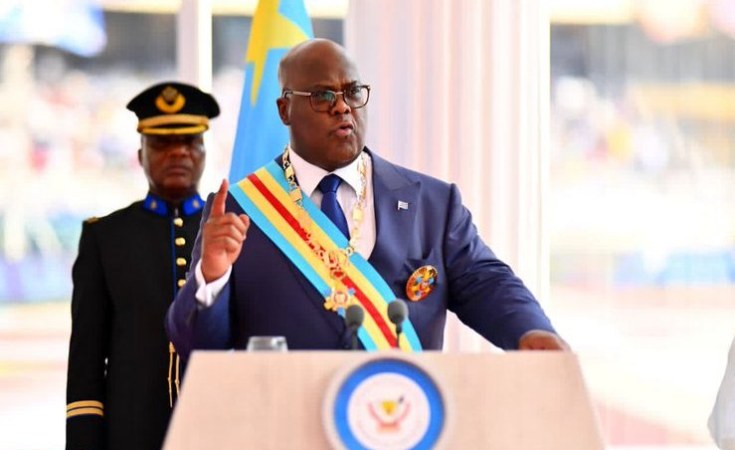Kinshasa — The president of the Democratic Republic of Congo, Felix Tshisekedi has been sworn-in for a second five-year term of office, following a landslide victory his opponents have refused to recognise due to widespread irregularities .
Tshisekedi took the oath of office this Saturday in Kinshasa's 80,000-capacity Martyrs sports stadium that was packed with supporters waving small flags along with government officials, African heads of state and other foreign envoys including from the United States, China, and France.
With armed military police deployed throughout the capital, there was no immediate sign opposition supporters in Kinshasa were heeding a call from two of Tshisekedi's main opponents to protest against his re-election.
The electoral authorities have acknowledged there were issues but dismissed allegations the vote was stolen.
The fractious standoff echoes previous electoral disputes that fuelled unrest in Congo.
With tensions simmering in the DRC's volatile eastern provinces, the 60-year-old president known as "Fatshi" specifically picked Martyrs stadium for the ceremony, in contrast with his first inauguration in January 2019, after controversially defeating Joseph Kabila, that took place in the gardens of the Palace of Nations - a solemn venue that has traditionally staged important official events.
Son of the late historic opposition figure Etienne Tshisekedi, Felix Tshisekedi came to the presidency promising to improve living conditions in the DRC - which boasts mineral riches but has a largely impoverished population of 100 million - and put an end to 25 years of bloodshed in the east.
Although he has not kept those promises, he campaigned strongly on his first-term achievements - such as free primary medication - asking for another mandate to "consolidate" the progress.
More than 40 million people were registered to vote on 20 December for a president, as well as national and regional lawmakers and municipal councillors.
'Gigantic, organised mess'
Polling was officially extended by a day to account for multiple logistical hitches and continued for days afterwards in remote areas.
In the end, Tshisekedi officially triumphed with over 73 percent of the vote.
Moise Katumbi, a former governor of the central region of Katanga, came a distant second with 18 percent.
Martin Fayulu, who says he was also robbed at the last presidential vote, garnered five percent.
Nobel peace prize winner Denis Mukwege, who won the Nobel peace prize winner for his work with rape victims, scored 0.22 percent.
The opposition contenders called for the election results to be cancelled and a protest planned for 27 December was subsequently banned and snuffed out by the police.
The archbishop of Kinshasa denounced the elections as a "gigantic, organised mess".
Accusations of fraud and an "electoral hold-up" have not abated and the fear of violence remains real in a country with a dark political past.
Security challenges
Katumbi and Fayulu appealed to supporters to "show their discontent" on Saturday, urging people "to stand up and say 'no'", from wherever they happen to be.
Tyres were reportedly burnt on Saturday morning on the streets of Goma, capital of the conflict-torn eastern province of North Kivu.
In the provincial town of Beni, also in the east, youths tried to set up barricades, but police intervened.
The electoral commission CENI has recognised cases of fraud, vandalism and intimidation, as well as the use of illegal voting machines.
In the general election, the vote has been annulled for 82 candidates - including three government ministers and four provincial governors.
However, the security challenge remains monumental for Tshisekedi.
Although there was a lull in fighting in the east during the election, violence has since resumed between the DCR army and M23 rebels, allegedly backed by neighbouring Rwanda.
Since mid-December troops from the 10-nation Southern African Development Community have been discreetly arriving in the DRC.
They are taking over from an East African peacekeeping force whose mandate was ended by the DRC government, which alleged it colluded with the rebels instead of fighting them.


